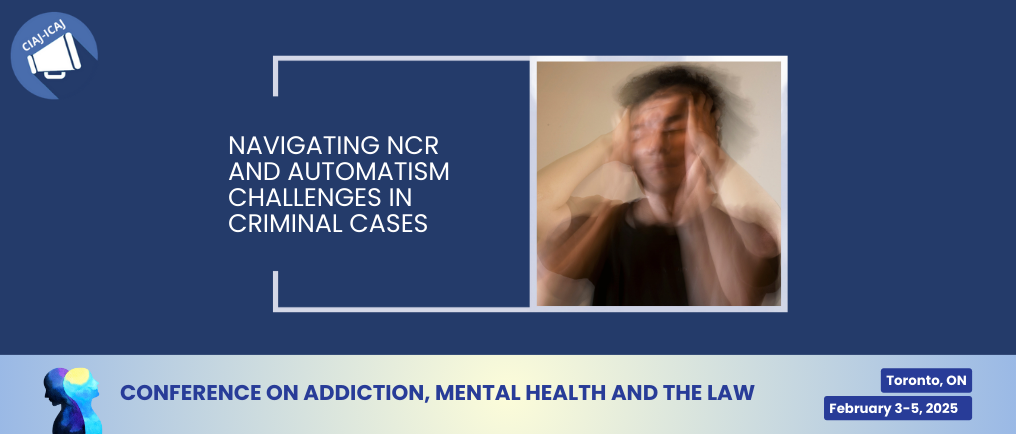Navigating NCR and Automatism Challenges in Criminal Cases

In the aftermath of R v Sullivan and R v Brown, both the legal profession and the wider public have struggled to reconcile cases in which violent acts are committed involuntarily. Legislation and jurisprudence relating to intoxication, mental state, and criminal culpability has faced heightened scrutiny, as Canadians attempt to balance competing principles of fairness and justice.
While the two cases themselves concerned a relatively minute technical gap in s. 33.1 of the Criminal Code (which has since been rectified 1 ) the response to the rulings demonstrates 2 an apprehension towards the defence of “self-induced extreme automatism,” in which a person is “unaware of their behaviour or incapable of consciously controlling it” as a result of intoxicants they willingly ingested 3 .
More broadly, cases where individuals whose capacities are reduced due to mental disorders or extreme intoxication commit violent acts demonstrate tensions between punitive and restorative justice in our society.
With the defences of “mental disorder” and “automatism” now back in the public eye, questions remain for our legal system to address:
- What circumstances do raise the defence of “self-induced extreme automatism”?
- How does the Criminal Code fail to address the needs of offenders and victims in cases involving reduced mental capacity and mens rea?
- And how can we better educate the public on offences which involve addiction and/or mental capacity?
To explore these questions and more, attend CIAJ’s conference on Addiction, Mental Health and the Law on February 3-5, 2025 in Toronto. One of the panels will address the challenges of criminal non-responsibility and extreme self-induced automatism, bringing together experts from the judiciary, criminal law and psychiatry to offer their unique perspectives:
- The Honourable Richard D. Schneider is a justice of the Ontario Court of Justice, where he presides at Toronto’s Mental Health Court, and alternate chair of the Ontario and Nunavut Review Boards. Before serving on the bench, Justice Scheider worked as a criminal defence lawyer, a clinical psychologist, and as counsel to the Ontario Review Board. Justice Schneider also lectures at the University of Toronto Faculties of Medicine and Law and has published extensively in the area of mental disorders and the law.
- Dr. Sophie Anhoury works as a forensic psychiatrist at the Southern Alberta Forensic Psychiatry Centre in Edmonton, Alberta. Dr. Anhoury holds extensive experience in treating and managing patients with complex mental health and legal issues, as well as in providing medical education and training for forensic psychiatry trainees.
- Michaela Donnelly has been practicing law for 28 years and has been with the provincial Crown in Vancouver for 20 years. She has spent most of her career doing trial work, in recent years focusing on murders, serious assaults and sexual assaults, and has been extensively involved with educating law students, lawyers, law enforcement professionals as well as psychologists and psychiatrists.
- Chris Johnson has practiced criminal law for over 35 years and has represented people charged with offences ranging from shoplifting to drug cases to murder at all levels of court in British Columbia, as well as the Supreme Court. Outside of court, Mr. Johnson has contributed to the practice of law through a variety of organizations, including the Main St. Court Users Committee, the Community Court Steering Committee, and currently as Co-Chair of the Legal Aid Action Committee. He is also the President of the East End Bar Association.
This panel offers a rich exploration of the legal and social complexities surrounding non-responsibility and automatism.
[1] Bill C-28: An Act to amend the Criminal Code (self-induced extreme intoxication), 1st Sess, 44th Parl, 2022: https://www.justice.gc.ca/eng/csj-sjc/pl/charter-charte/c28_1.html
[2] Sara Sanabria, “Clarifying the confusion about the recent Brown and Sullivan decisions” (7 July 2022), online: https://www.mcgill.ca/definetheline/article/clarifying-confusion-about-recent-brown-and-sullivan-decisions-self-induced-extreme-intoxication
[3] Bill C-28.

